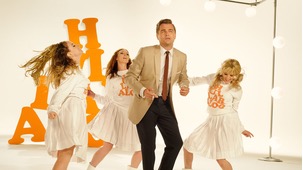Have you ever walked out of a movie theatre listening to the audience discuss the film you just saw, and wonder if you saw the same film? Are there two versions of Once Upon a Time… in Hollywood? Did everyone else watch an awesome version, and was I, somehow, the only person who watched a different, more lacklustre one? To be clear, I’m not saying I hated the film, I just cannot for the life of me understand what all the fuss is about.
Love it or hate it, Quentin Tarantino’s work is a certain type of way. There are a few signature elements that make a Tarantino film a Tarantino film: insane, over-the-top violence, memorable oddball characters, and a soundtrack that slaps. While often shockingly tone deaf, it’s hard to beat Tarantino for sheer entertainment factor. Until now, that is. Once Upon a Time… in Hollywood has all the key elements, but it somehow feels… blah, for lack of a better word.
My main beef with Tarantino’s work is the way in which much of it is hailed as ‘homage’ to other works, because there is a big difference between homage and straight-up ripping other people’s work off. To wit: Homage: "Hey, that shot kind of reminds me of the one from Lady Snowblood." Rip off: "Hey, that is the shot from Lady Snowblood."
Once Upon a Time… is probably the least ripoff-ish of Tarantino’s offerings that I’ve seen, which I suppose is a refreshing change, but halfway through the film I came to the uncomfortable realization that, when not blatantly cribbing – sorry, paying homage to – someone else’s work, Tarantino’s output is pretty flaccid. Even the quintessential (Quent-essential? Sorry) batshit violence is limited to like, three minutes right at the end of the film. As problematic as Tarantinoan violence might be, I was internally pleading for it out of sheer boredom by the third act.
Don’t get me wrong, the film has its strong points. The actors are all undeniably great – even Margot Robbie as Sharon Tate, given that the extent of her performance is looking adorable and sweetly cooing a whopping three lines of dialogue. Some scenes are unnecessarily drawn out, like Rick Dalton struggling to nail his performance in some crappy western, but it is some of Leonardo DiCaprio’s best work, so bygones.
And your soundtrack definitely slaps. It made me nostalgic for a double-disc compilation album I owned in high school called Spirit of the 60s. It had the most unfortunate cover art ever (picture awkward white people in hippie costumes stiffly throwing peace signs against a neon tie-dyed background), but I loved every single track and absolutely had Deep Purple’s Hush on repeat and full blast for most of grade ten. It made me feel nostalgic for a time twenty years before I was even born, and for music whose creators were mostly dead by the time I discovered it.
I think I was supposed to have a similar reaction to Once upon a time… in Hollywood, but no such luck. Even with the fun(?) twist at the end, there really isn’t much going on in the way of plot. Once Upon a Time… seems like it’s meant to be more of a mood than a story – a series of long-ish vignettes pushed hastily in the last few scenes towards a conclusion that is only shocking if you haven’t already seen Inglorious Basterds. Or any other Tarantino movie. The overarching purpose of the film seems to be to beat us over the head with a big fat nostalgia stick.
The main draw is Tarantino’s recreation and remembrance of Hollywood in the late 60s, but I wasn’t quite sold, mainly because the film didn’t convince me that I was supposed to be sad at the twilight of this particular era. We are shown Hollywood in a state of something like decay, rather than a time of transition. The old studio system is on the verge of collapse, with many of its stars struggling to accept the end of their glory days. But it was also a very dark time, especially given the murderous hippie cult on the loose, signalling the end of the sunshine-and-rainbows era depicted on my delightfully horrendous CD cover. So I was resistant to the film’s attempt to make me look at that particular snapshot and sigh for some mythical good old days that weren’t actually all that great.
More importantly, they aren’t actually over. When you think about it, the privileged, white, Hollywood elite didn’t go anywhere. The studios of old may be gone, but the studio system just gave itself a makeover and kept on trucking. So what exactly was I supposed to be mourning? Anyone who was actually in/of that era will likely feel differently, which is totally fair, but Once Upon a Time… failed to invoke in me any of the melancholy or nostalgia I was supposed to feel, because its depiction of a bygone era doesn’t sell the ‘bygone’ part beyond a very superficial level.
Once Upon a Time… in Hollywood is entertaining enough, but the elements that draw you to a Tarantino film feel sort of faded or subdued. I hesitate to pan it completely because it does feel like Tarantino has tried something different, more personal and original, so I realize I might be blaming an apple for not being an orange. My favourite thing about Tarantino movies is usually the music anyway, and there you absolutely delivered, so I can’t complain too much. In fairness, maybe I’m just missing the point, whatever it is. Maybe I’m just the one person who can’t see the hidden object in the weird 3D Magic Eye picture.
Best,

Nat




